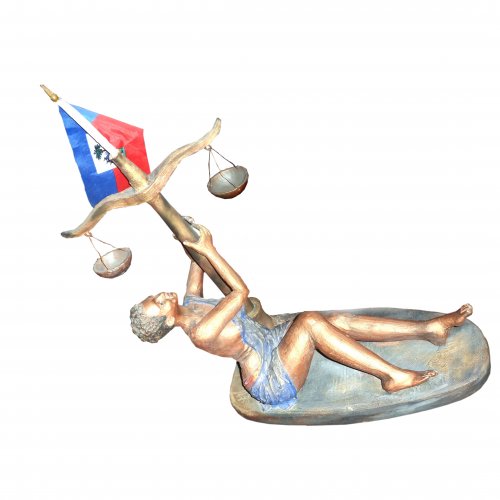Best Labor Law Lawyers in Haiti
Share your needs with us, get contacted by law firms.
Free. Takes 2 min.
Or refine your search by selecting a city:
List of the best lawyers in Haiti
About Labor Law in Haiti
Labor law in Haiti is designed to regulate the relationship between employers and employees, ensuring fair treatment in the workplace. These laws cover various aspects such as wages, working hours, occupational health and safety, and protections against discrimination and wrongful termination. Haiti's labor laws are heavily influenced by international standards, including conventions set by the International Labour Organization (ILO), aiming to protect workers' rights and ensure decent work conditions.
Why You May Need a Lawyer
Engaging with labor law can be complicated, and there are several instances where a lawyer's expertise might be necessary. Common situations include disputes over wrongful termination, wage discrepancies, workplace discrimination, negotiating employment contracts, or ensuring compliance with health and safety regulations. A lawyer can provide legal advice, represent you in negotiations or courts, and help protect your rights under Haitian labor law.
Local Laws Overview
The Haitian Labor Code is the principal legal framework governing labor relations in the country. Key aspects include:
- Minimum Wage: Haiti established a minimum wage policy, which can vary by industry and region.
- Working Hours: The standard workweek is typically 48 hours, with regulations for overtime compensation.
- Health and Safety: Employers are required to provide safe working environments and adhere to safety regulations.
- Employee Rights: There are protections against unfair dismissal, discrimination, and harassment.
- Social Security: Provisions for social security benefits, including maternity leave and pensions, exist under Haitian law.
Frequently Asked Questions
What is the legal minimum wage in Haiti?
The legal minimum wage can vary based on the sector of work and specific regional laws. It's important to check the latest regulations as these figures are subject to change.
What are my rights if I am unfairly dismissed from work?
Employees unfairly dismissed may be eligible for compensation or reinstatement. Legal guidance is recommended to navigate these proceedings effectively.
Are there laws protecting against workplace discrimination?
Yes, Haitian labor law prohibits discrimination based on race, gender, religion, and other protected characteristics.
How are overtime wages calculated?
Overtime wages are typically calculated at a premium rate, based on hours worked beyond the standard 48-hour workweek.
Can my employer change my work conditions without my consent?
No, significant changes to your employment terms typically require your consent or an official modification to your contract.
What should I do if I'm experiencing harassment at work?
Document incidents and seek legal assistance. Employers have a duty to address harassment and ensure a safe work environment.
What are my entitlements during maternity leave?
Haitian labor laws provide for maternity leave, though specifics may depend on individual contracts and collective bargaining agreements.
What is considered a safe working environment?
A safe working environment adheres to health and safety standards set by the law, ensuring protection against potential hazards and risks.
Do I have the right to join or form a union?
Yes, workers in Haiti have the right to form and join trade unions to collectively negotiate labor conditions.
What should I include in an employment contract?
An employment contract should clearly outline job responsibilities, compensation, working hours, and other relevant workplace policies.
Additional Resources
For further assistance and information on labor law in Haiti, consider reaching out to:
- The Ministry of Social Affairs and Labor (MAST): Provides information and services relating to labor rights and workplace regulations.
- Labour Unions: Organizations like Confédération des Travailleurs Haïtiens (CTH) can offer guidance and support.
- Legal Aid Clinics: Many non-profits and local advocacy groups offer free or low-cost legal advice.
Next Steps
If you need legal assistance in labor law, consider taking these steps:
- Identify Your Issue: Clearly define the issue you're facing and gather all relevant documents and evidence.
- Consult with a Lawyer: Seek professional legal advice from a lawyer specializing in labor law. You can find a lawyer through local bar associations or legal clinics.
- Reach Out to Labor Authorities: Contact the Ministry of Social Affairs and Labor for guidance on handling workplace disputes.
- Utilize Union Support: If you’re part of a union, reach out for assistance and representation in negotiations or legal matters.
Taking prompt and informed actions can significantly impact the outcome of workplace disputes and interactions concerning labor law.
Lawzana helps you find the best lawyers and law firms in Haiti through a curated and pre-screened list of qualified legal professionals. Our platform offers rankings and detailed profiles of attorneys and law firms, allowing you to compare based on practice areas, including Labor Law, experience, and client feedback.
Each profile includes a description of the firm's areas of practice, client reviews, team members and partners, year of establishment, spoken languages, office locations, contact information, social media presence, and any published articles or resources. Most firms on our platform speak English and are experienced in both local and international legal matters.
Get a quote from top-rated law firms in Haiti — quickly, securely, and without unnecessary hassle.
Disclaimer:
The information provided on this page is for general informational purposes only and does not constitute legal advice. While we strive to ensure the accuracy and relevance of the content, legal information may change over time, and interpretations of the law can vary. You should always consult with a qualified legal professional for advice specific to your situation.
We disclaim all liability for actions taken or not taken based on the content of this page. If you believe any information is incorrect or outdated, please contact us, and we will review and update it where appropriate.
Browse labor law law firms by city in Haiti
Refine your search by selecting a city.








